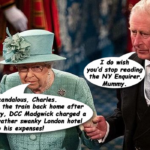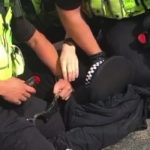Regular NYE contributor and NUJ journalist TIM HICKS has won an NUJ prize for the best letter submitted to the NUJ magazine “The Journalist”.
Tim is a Chartered Accountant and has been writing for the NYE and other media outlets for many years. His articles are wide ranging, but mainly cover crime. He has also covered the police and the media, community and citizen journalism, freedom of the press, whistleblowing, information warfare, attacks on free speech and suppression of journalists by public bodies.
His work has sourced many articles in the national press and also part of the award winning book “IN PLAIN SIGHT – The life and lies of Jimmy Savile” by Dan Davies. (NYE Review here) He can be seen on the BBC here.
Typically Tim’s letter was on five important subjects:
- Freedom of the press.
- The Enniskillen based Impartial Reporter holding the police to account and forcing the police to take action even if it means revealing previous policing failures.
- The consequences of revealing policing failures.
- The importance of local media outlets to criminal investigations.
- The decline in local media outlets in the traditional print media.
Tim Writes:
NYE Journalist Wins NUJ Prize
Introduction
I was very pleased to get the prize for the best letter to the NUJ’s magazine “The Journalist”. Particularly as my letter was judged against many others from full-time journalists working for large traditional media organisations.
I belong to the NUJ because I believe passionately in the freedom of the press, the importance of vibrant local media to local communities, the importance of holding officials and public bodies – particularly the police – to account, and of providing a voice for victims. In this context the NUJ has been very helpful in defending freedom of the press by writing to Chief Constable Winward raising its concerns about her repressive media policy.
The Enniskillen-based Impartial Reporter holding the police to account
The original article in “The Journalist” which inspired my letter is below:

Article by Anton McCabe
I wrote because I wanted to congratulate the Enniskillen-based Impartial Reporter on a very successful investigation despite opposition from the police. This resulted in some measure of justice for some of the victims, which had not been sought for them by the police, although they are the public body charged with the duty of obtaining it. BBC report here.
It was only when local investigative journalist Rodney Edwards took up the case that the police were forced to conduct an impartial investigation. A classic case of good journalism holding a powerful pubic body to account in the public interest.
It reminded me of the NYE team’s similar battle with North Yorkshire Police (NYP) to force it to investigate Jimmy Savile and Peter Jaconelli, and our current battle to force the Chief Constable to re-open the “Nude in the Nettles” case. NYE investigation here.

[Please note the letter afterwards by Alexander Garrett on NUJ travel expenses, demonstrating that NUJ journalists hold their own executives to account on this controversial subject, not just Chief Police Officers]
The decline in traditional print media and the rise of internet citizen and community journalism
Journalism in the UK is undergoing massive change. Local print media titles are folding and their readership is falling all over the UK. In Scarborough and Whitby, The Whitby Gazette still publishes every Thursday, but its readership is declining. The Whitby Gazette, like the Scarborough News, is owned by the Johnston Press. The nearest non-Johnston press publication is the York Press, which hardly ever covers the Scarborough and Whitby area.
Although I lament the decline in local print media, it is an inevitable result of living in the age of the internet, which allows instant free access to news. Traditional media no longer has the readership to fund large teams of journalists, or specialist crime correspondents who know the history of the area and the background to local crime. They have become more dependent on press releases from public bodies and are much more wary of taking on controversial issues for legal reasons. The Whitby Gazette and Scarborough News have not had a specialist crime correspondent for twenty years.
More positively, I believe that the rise of internet citizen and community journalism is the beginning of a healthy trend in British journalism. As local print media declines, internet news magazines like the NYE will open up journalism to local people acting as citizen and community journalists, moving the media away from domination of the media by small groups of wealthy press barons and publishing houses like the Johnston Press. To quote the former Labour Prime Minister Harold Wilson:
“I get a little nauseated , perhaps when I hear the phrase “freedom of the press” used as freely as it is, knowing that a large part of our proprietorial press is not free at all.”
Yorkshire Coast Radio has a very active website and local news every hour. But for in depth, continuous coverage of serious issues, the NYE is now one of the leading local internet news magazines in the UK and acts as a forum for community and citizen journalism. I believe this healthy for North Yorkshire.
Community and citizen journalism tend to be better informed than the mainstream media, because of its local connections. It is also much more critical, arising from stronger feelings about local issues, because community journalists are closer to the issues and the people involved in them. This makes community and citizen journalism more passionate and critical of officials and elected representatives than the traditional media.
As a consequence, some public officials and elected representatives will not accept the right of citizen and community journalists to hold public bodies, officials and elected representatives to account – because they subject them to a level of scrutiny that they have previously not had to endure from the traditional media.
The consequences of revealing policing (and other) failures.
We should not forget that mainstream journalism was very effectively manipulated by the Metropolitan Police to conceal the circumstances of Mr Ian Tomlinson’s death after he was assaulted by PC Simon Harwood of the Metropolitan Police. (Wikipedia article Death of Ian Tomlinson here). Initial police statement here.
It was only thanks to work by citizen journalists (citizen journalist video here) that the truth emerged five days later. Guardian report Citizen Journalism counters Police propaganda here. Footage showing the full chain of events leading up to Mr Tomlinson’s death including PC Harwood attacking a TV Cameraman here. This led to Harwood’s dismissal from the Metropolitan Police. Had it not been for citizen journalism, PC Harwood would probably still be a police officer. Consequently some police officers fear citizen and community journalists. Hence perhaps the reason that some police officers are determined to suppress it.
Unfortunately, some public bodies have responded to community and citizen journalists with an aggressive policy of media suppression, which in my view this has evolved into what I have termed the “Savile/Jaconelli Fox/Winward Information Warfare Doctrine for Media Suppression”.
Information Warfare was until recently a military term but is a very broad concept. It is now applied outside military conflicts and the armed forces. It has several strands:
- Information Warfare is a United States military concept involving the collection of tactical information, assurance that one’s own information is valid, spreading of propaganda or disinformation to demoralize or manipulate the enemy and the public, undermining the quality of opposing force information and denial of information-collection opportunities to opposing forces. Most of the rest of the world use the much broader term of Information Operations which has combined technology and the more human-related aspects of information use.
- Media manipulation is a series of related techniques in which an image or argument that favors their particular interest of the organisation is promulgated. Media manipulation tactics may include the use of outright deception and often involves the suppression of information or points of view.
- Information Operations and Media Manipulation are often incorporated into Media Operations. (Ministry of Defence).
Media operations are part of Information Warfare and can be passive, proactive and/or aggressive. They can include:
- Information suppression.
- Information withdrawal.
- Withdrawal from contact and interaction.
- Media suppression.
- Media manipulation.
- Legal action or threats of legal action.
- Computer
- Surveillance, both electronic and physical.
- Detention or arrest, or threats of arrest.
- Stonewalling: “A refusal to communicate or cooperate. Such behaviour occurs in situations such as ….diplomatic negotiations, politics and legal cases. Tactics in stonewalling include giving sparse, vague responses, refusing to answer questions, or responding to questions with additional questions”.
The NYE team revealed that Conservative Councillor and Mayor of Scarborough Peter Jaconelli was a paedophile who had been openly abusing children in Scarborough in joint enterprise with Jimmy Savile and that North Yorkshire Police had known all about it. This was the worst single case of police corruption in the history of North Yorkshire Police (NYP). It caused enormous embarrassment to North Yorkshire Police and of course to Scarborough & Whitby Conservatives, who have dominated Scarborough Borough Council (SBC).
It appears to me that an information warfare operation was unleashed on NYE’s journalists in retaliation. This has evolved over time into the Jaconelli/Savile Fox/Winward Information Warfare Doctrine for “Media Suppression” – or SAVILEFOXWIN, for short.
Although many people have contributed to this doctrine as it evolved, it is named after two prominent public figures in Scarborough that were child abusers (Peter Jaconelli and Jimmy Savile, protected by NYP) and two prominent advocates of media suppression:
- NYP Superintendent Tom Fox (Retired): The senior police officer commanding policing in Scarborough for many years, whose major claim to fame is that he failed to arrest Jimmy Savile and Peter Jaconelli, despite the fact that they were openly abusing children in Scarborough and Whitby. Superintendent Fox retired and went on to become a Conservative SBC Councillor and Leader then Mayor of Scarborough. Incredibly, he openly advocated that community journalists should be subject to “threat and retaliation” for saying “what they want when they want” in full SBC council. NYE report with video here. This was helpful to the NYE because it revealed the true attitude of the police and some Scarborough Councillors (not just Conservatives) towards the NYE and that they were prepared to attack and punish journalists.
- NYP Chief Constable Lisa Winward: Her major claim to fame is that she is one of the police officers that used public funds to sue Nigel Ward and I for harassment, hoping to obtain an injunction to prevent the NYE reporting on NYP. She also intended to personally benefit by obtaining damages for herself. In the event she got no money, no costs and no injunction, but did succeed in leaving the poor old North Yorkshire taxpayer with the legal bill for her failed action. Summary (courtesy of Private Eye) below.

The “Jaconelli/Savile Fox/Winward Information Warfare Doctrine for Media Suppression” is currently followed by SBC, NYP and the Office of the Police, Fire & Crime Commissioner for North Yorkshire. It is based on Eight Principles:
The Jaconelli/Savile Fox/Winward Information Warfare Doctrine for Media Suppression.
- Immunity: Elected representatives, public officials and bodies should be immune from criticism or being held accountable for their personal conduct, actions, policy and/or stewardship of public money.
- Secrecy: The public should have no right to any official information or any knowledge of how their money is spent. Information should only be divulged if it is non-controversial and then only as a gratuitous/unnecessary act of kindness on the part of the public body.
- Protection: Whenever there is crime, misconduct or waste by elected representatives or public officials, the public body has a duty to conceal it from the public, to protect the individuals concerned from any consequences for their actions.
- Censorship: Public bodies should uphold freedom of speech, freedom of information and freedom of the press, unless it involves of criticism of elected officials, public servants and/or public bodies. If this occurs, censorship is acceptable to protect them from criticism and protect the public from the truth.
- Intransigence: All criticism must be ignored, no matter how much it costs the taxpayer, or the reputational damage to the public body.
- Unaccountability: Public bodies and officials should not be accountable to the public. They have no duty to respond to criticism or public concern.
- Perks: Public officials and elected representatives are entitled to covertly obtain pecuniary advantages/perks/sweeteners/freebies for themselves from public funds, (including but not limited to payment of expenses for hobbies, non-taxable unaccounted tax free training allowances, misuse of vehicles for personal use, selling off preferential tickets for concerts, not disclosing interests, foreign travel to attend alumni conferences, double dipping internet allowances, free tickets, conflicts of interest, inflated mileage allowances, etc.). Perks are none of the taxpayers business: It is wrong for perks to be discussed, exposed and/or challenged.
- Defence of National Security and prevention of terrorism: Threats to National Security and terrorists are who and what we say they are. The full range of national security, anti-terrorism powers and exemptions from the Freedom of Information Act for security reasons should be applied to journalists, their contacts or associates, and members of the public. Particularly (but not limited to) if they are asking too many questions about things that are embarrassing to a public body, or doing anything officials and elected representatives don’t like.
- Suppression: Any citizen, journalist of media or organisation that attempts to use its rights of free speech and/or freedom of information to expose misconduct, waste or crime by elected representatives, public officials and/or public bodies is contravening principles 1 – 7 above. This is unacceptable because it is embarrassing to public officials and elected representatives. This therefore justifies use of Information Warfare for the purposes of:
- Threat: The threat of the measures below will intimidate the instigators of criticism and deter coverage of any issue that causes embarrassment to elected representatives and public officials.
- Punishing those that cover issues the public should be protected from discourages further coverage.
Suppression can utilise the full range of civil, criminal and anti-terrorist regulations, and unlimited funding available to public bodies including some or all of the following techniques (in no particular order):
9.1. Issuing denials of events and actions alleged by community and citizen journalists, even though the denials are untrue.
9.2. Issuing media statements that falsely allege misconduct by community and citizen journalists.
9.3. Using the Regulation of Investigatory Powers Act to intercept and read e mail from NYE journalists, so their sources of information can be identified and neutralised.
9.4. Ignoring information on crime and misconduct revealed by community and citizen journalists, even though this prevents the proper investigation of crime.
9.5. Threatening journalists with international arrest warrants.
9.6. Ordering journalists to appear at a police station to be arrested without lawful cause, then withdrawing the threat of arrest the day before the meeting, to cause maximum distress and anxiety.
9.7. Alleging that articles are “misleading”, when in fact they are accurate.
9.8. Demanding all publications be withdrawn from the internet because they are deemed to be “misleading” by a senior police officer.
9.9. Preventing access to information by alleging that community or citizen journalists are “a pressure group”. Then using this as a pretext to ignore correspondence and freedom of information requests, so that public bodies can manipulate the media by picking and choose which media outlets they can disseminate information to.
9.10. Closing down local new media outlets by asking their internet service provider to withdraw service.
9.11. Making public funds available to finance civil and criminal prosecutions by public officials against journalists, knowing that most individuals cannot afford the cost of High Court proceedings and will therefore be forced to cave in eventually, even if they are in the right.
9.12. Portraying funds misused on legal action against citizen and community journalists as expended for the justifiable purpose of preventing nuisance, crime and/or the harassment of innocent people, although in fact they are being expended to suppress free speech and legitimate criticism.
9.13. Submitting misleading evidence into Court.
9.14. Covertly forging alliances with individuals, politicians and other public bodies, then offering them public funding for legal action against journalists, so they can act as allied proxies.
9.15. Prohibiting filming openly and lawfully in a public place.
9.16. Refusing to recognise individual citizen or community journalists as members of the media, as a pretext to withhold information.
9.17. Treating media enquiries from citizen and community journalists as Freedom of Information Act (FOIA) requests, so that the exemptions and time delay that can be applied under the FOIA can be used to deny and delay the release of information to journalists that the public are entitled to know. Thereby using the FOIA to impose censorship.
9.18. Providing funding to a politician to sue journalists, because it is alleged media coverage contributed to an election defeat.
9.19. Threats of legal action and demands to remove articles from a solicitor acting on behalf of a politician, even though the complainant is unable to specify any defamatory or inaccurate content.
9.20. Demands to remove quotes from speeches in parliament that were critical of a public body even though they were quoted in Hansard. Thereby restricting the public’s access to parliamentary comment that is critical of public bodies.
9.21. Suppression of complaints.
9.22. Offensive personal e mails.
9.23. False allegations of benefit fraud.
9.24. Head of the Police Authority meeting with the police to discuss criminal proceedings against a journalist in which she was not a party.
9.25. Alleging community and citizen journalists are causing nuisance, annoyance, distress, alarm and/or harassment to elected representatives and public officials, and preventing public bodies from functioning. Then using this as a pretext to justify using the enormous powers of arrest, surveillance and/or criminal prosecution available to public bodies against community, and citizen journalists.
9.26. Withholding information on grounds of national security.
9.27. Using national security and anti-terrorism powers to conduct covert surveillance of Councillors, journalists and members of the public, to protect Councillors from hearing criticism of any officials, by withholding correspondence from them; particularly if it concerns the officials conducting the surveillance.
The Four Pillars of Democracy and Freedom of the Press
All of the above techniques have been used against NYE journalists at one time or another. Yet in the years I have been writing for the NYE, no one has ever pointed out any factual inaccuracy in any article I have had published in the NYE. Despite this NYE journalists have had to fight off multiple legal actions, threats of arrest and a media disinformation campaign from various public bodies, which have cumulatively cost the North Yorkshire taxpayers hundreds of thousands of pounds, for no gain whatsoever.
Notwithstanding this onslaught, the NYE is still publishing, informing the public and holding public bodies to account in North Yorkshire.
To quote David Davis MP, a leading advocate of press freedom:
“A truly free press must be able to expose uncomfortable truths, highlight underperforming governmental departments and be a nuisance to the establishment.
Journalists must be able to investigate, probe and expose issues of legitimate public concern.
If our press is unable to do this, then society will suffer for it. Being subject to constant fear of arrest or establishment misconduct will undermine the necessary freedom of the press, and lead to worse things besides.“
There are four pillars of government in a healthy democracy:
- Legislature: The legislature is elected and passes laws which reflect public opinion.
- Executive: The executive enforces and implements laws.
- Judiciary: The judiciary interprets law and ensures that the executive implements laws in accordance with the wishes of the legislature.
- Media. The media ensures that the people are aware of what’s happening, ensures transparency in the working of the other pillars, identifies issues of public concern, holds public bodies to account and mobilises public opinion when they do wrong.
To illustrate the point, let us consider two public bodies -SBC and NYP- that have been prominent in attempts to supress the NYE.
It is deeply saddening to see that both Labour and the Independent SBC Councillors are following exactly the same information warfare policy against journalists as the Conservatives, which they criticised so vociferously when they were in opposition. They appear not to understand that journalists are a necessary control over the other three pillars and that public bodies must submit to scrutiny by journalists. By suppressing new media, they are undermining the democratic process.
Being primarily a crime journalist, I face another dilemma. When I run an appeal for information which results in fresh evidence on a crime, I act as an agent of the police as part of the second pillar. However, when I reveal misconduct in a public body, I am acting in the fourth pillar. It is a matter of great regret that Chief Constable Winward appears not to understand this basic simple distinction. She has adopted the asinine position of retaliating for lawful criticism I have issued when acting in the fourth pillar, by ignoring all helpful information the NYE has developed when acting in the second pillar.
Chief Constable Winward’s first act on promotion to Chief Constable was to write to me confirming that NYP did not recognise me as a member of the media. NYE report with the letter here. The impact of this was that it cut off all police contact with the NYE, thereby denying her officers access to a useful local media outlet that had a history of assisting in police investigations. Consequently NYP is currently ignoring witnesses the NYE has identified in the “Nude in the Nettles” murder, which I believe could help her officers progress the case. Obviously this damages the ability of NYP as a local media outlet to assist the police to investigate crime. I can only conclude that NYP Chief Officers believe that the suppression of criticism and retaliation against journalists for issuing it is more important than fighting crime.
Clearly this is unsatisfactory. Every other police force that I have dealt with as a crime reporter (Kent, Essex, Avon and Somerset, Gwent, Metropolitan, South Yorkshire, West Yorkshire, Greater Manchester, Police Scotland, Cleveland, Sussex, Durham) works well with new media. Only North Yorkshire Police and the North Yorkshire Police, Fire & Crime Commissioner follow the “Jaconelli/Savile Fox/Winward Doctrine”.
A draft of this article was provided to Comrade Siddons (Leader of SBC Labour Councillors), Councillor Bastiman (Leader of SBC Conservative Councillors), Councillor Cross (Leader of the SBC Independent Councillors), Mrs Lisa Dixon (SBC Borough Solicitor), Councillor Chatt (for the non-aligned independent Councillors) Chief Constable Winward and Police Fire and Crime Commissioner Mulligan. Needless to say, no comment was received from any of them, in accordance with Principle 6 of the Jaconelli/Savile Fox/Winward Information Warfare Doctrine above.



























Comments are closed.